Tribute to Fr. Francis Friesen OSB (1921 – 2006)
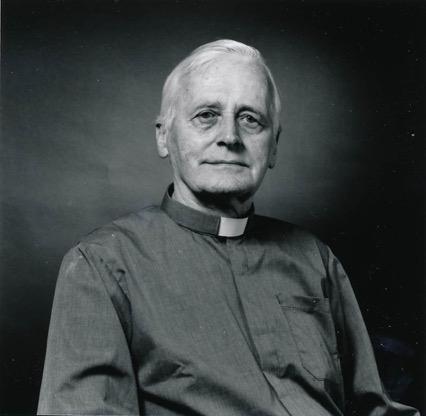
By Christoph Müllerleile
Rev. Francis Friesen OSB was pastor in Seaford Town, Westmoreland, Jamaica, at my time as a representative of a German foundation in the English-speaking Caribbean. He died on 29th January, 2006, at the age of 84 in Nijmegen, Netherlands, where he had lived after his departure from Jamaica, in the Berchmanianum, a home for retired and infirmed priests and male religious. He was laid to rest on 3rd February, 2006, in the St. Albert Abbey at Egmond Binnen.
Francis Friesen was highly decorated as a Ridder in de Orde van Oranje Nassau, knight of the Order of Orange Nassau, in the Netherlands, and with the Bundesverdienstkreuz, the Order of Merit of Germany.
Father Francis, whose birth name was George Theodorus Johannes Friesen, was born on 1st May 1921 in Nijmegen, Netherlands. He joined the Benedictine congregation, took on the name Dom Franciscus and started his term of duty as a priest in the Caribbean in Trinidad where he was a member of the congregation of the Mount St Benedict Monastery. This Benedictine Monastic community is the largest and oldest in the Caribbean. I visited him in Seaford town several times and had contact with him in Nijmegen. His last letter to me dates from 6th January, 2006. He wrote that he had a heart attack some three months ago and had to undergo a stomac surgery.
Fr. Francis was parish priest in Seaford Town from 1970 to 1986. I first met him in Seaford Town in in 1982. At that time he was about to work out a tourism program for Seaford Town catering mainly to German, American and Canadian tourists who wanted to learn more about the German heritage of Seaford Town. As of 1970 he established a little museum in Seaford Town of the German immigrants to Jamaica. He later founded the Jamaican-German Historical Research Group and visited the places in Germany where the immigrants to Jamaica came from. He was also a member of the German-Jamaican Soeciety in Germany.
He did a lot for the people in the area, established the St. Boniface Training Centre in Seaford Town and in the eighties saved it from closure by acquiring financial assistance from German and other aid agencies. He built the Sacred Heart Health Centre in Seaford Town with assistance of the Dutch Memisa foundation, opened in June 1984. I think he was a genius of acquiring funds from many aid agencies for his parishioners.
Fr. Francis had to leave Jamaica in June 1986 because he got hepatitis and Q-fever and became half-blind. His last big activity was organizing the celebrations for the 150th anniversary of the arrival of Germans in Seaford Town in 1985.
I met him in the Berchmanianum once when he could only read and write with the assistance of a friend. Later his eyesight became a little better.
After his death I got hold of his research estate. In 2019 I have worked up and organized his papers. His materials are stored in the magazine of the bequests of the Ibero-American Institute of the Stiftung Preussischer Kulturbesitz in Berlin since July 2020. Website https://ogy.de/ctuj Questions about use answered here https://ogy.de/f7by

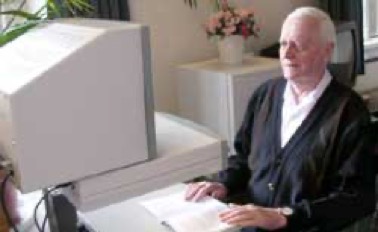
Fr Francis working at his device which allowed him to read up to his last days.
Photo: Catholic News, Port-of-Spain
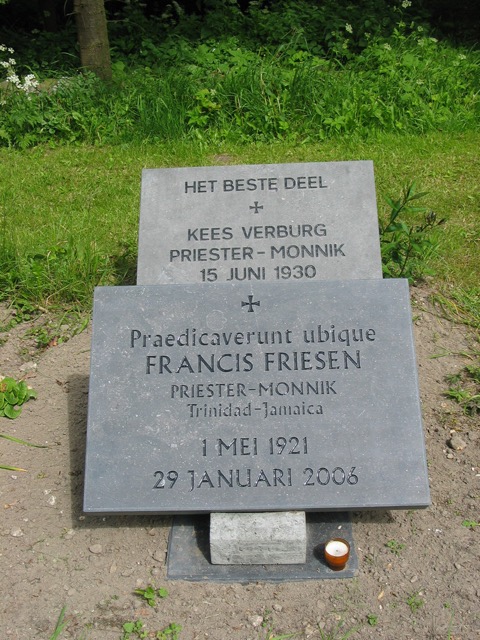
Fr Francis Friesen's grave at the St. Albert Abbey at Egmond Binnen. Photo:br. Gerard Mathijsen osb
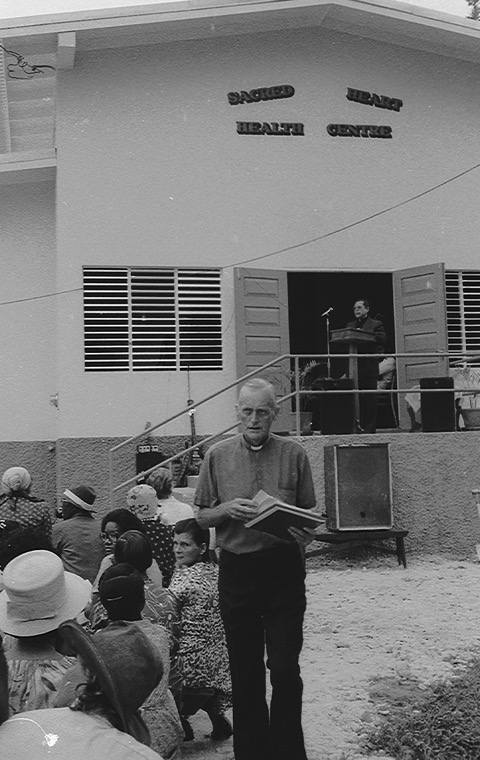
Fr. Francis Friesen OSB at the inauguration of the Sacred Heart Health Centre in Seaford Town, Westmoreland, Jamaica, 14th June 1984.
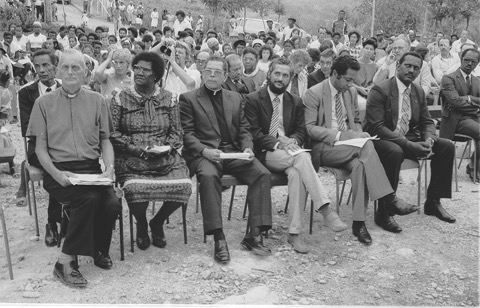
Inauguration of the Sacred Heart Health Centre in Seaford Town, Westmoreland, Jamaica, 14th June 1984. Front row from left Fr. Francis Friesen, Parish priest, Euphema Williams MP, Edgerton Clarke, Bishop of Roman Catholic Diocese Montego Bay, Howard "Tony" Wedemire MP (descendant of German immigrants in Seaford Town), Minister of Health Dr. Kenneth Baugh. Photos: Christoph Müllerleile
Father Francis Friesen Memorial Service
By Byron Balfour
A Dutch Roman Catholic Benedictine monk, Father Francis Friesen, who spent 16 years living among the people of Seaford Town in the hills of rural Westmoreland, and working to preserve the rich German history and ancestry of the village, has been hailed and fondly remembered by local church and community leaders.
The encomiums for Father Francis’ life of “unswerving dedication, sweeping generosity and astute leadership” flowed liberally on March 14, 2006, from the top echelon of the Roman Catholic Church in Jamaica, and from prominent community leaders and other officials. They were speaking at a touching memorial mass in thanksgiving for the life of Father Francis, at the Sacred Heart Catholic Church, in Seaford Town.
The ceremony was held six weeks after the beloved and widely-respected priest died last January 29 in his native Holland, The Netherlands, where he had been in retirement at a home for retired and infirmed priests. Father Francis was 84, and died from a series of medical complications. He suffered a massive heart attack the night before he succumbed, and was buried on February 3, in the St. Albert Abbey, at Egmond Binnen.
Some of Father Francis’ closest Jamaican friends from within and outside of the church spoke highly of his munificence, his gentle, caring disposition, and his unselfish, unswerving willingness to assist. They included the Most Rev. Charles H. Dufour, Bishop Of Montego Bay and main celebrant at the mass; Archbishop Emeritus of Kingston, The Most Rev. Edgerton Clarke, who delivered the homily; and the Custos of Westmoreland, Mr. Owen Sinclair.
It was under Archbishop Clarke’s portfolio as the first Bishop Of Montego Bay that Father Francis was posted in Seaford Town as parish priest from 1970 to 1986, when he retired and left Jamaica, after establishing several aid efforts and raising huge sums for the development of the district. Father Francis’ thrusts included establishing the St. Boniface Training Centre.
Archbishop Clarke’s rich, educating homily spanned a broad spectrum of Father Francis’ life, including his posting as a monk in Trinidad – where he lived before coming to Jamaica - and his life in other countries.
The Archbishop Emeritus classified Father Francis as having “lived a life so others could walk in his footsteps of devoted commitment to God and service to his people.” He recalled the many trips Father Francis frequently made on his scooter between Seaford Town and Kingston, and described the late priest as “a scholar of no mean order.” According to Archbishop Clarke, Father Francis deeply wanted to work among Jamaicans, and his efforts helped develop Seaford Town “economically, socially and educationally.”
Archbishop Clarke praised Father Francis’ devotion to duty, his commitment to serving the local community, and his abiding quest for the German roots and ancestry of many Seaford Town residents.
Custos Sinclair felt that Father Francis “stood out as a light in the darkness, as a fine role model, and as an extremely kind human being.” Jamaica is much the better for having known Father Francis, the Custos declared.
“He was very honest, humble and deeply dedicated to the community of Seaford Town, and, indeed, the Caribbean,” Custos Sinclair observed. He added: “The sincerity of his dedication to duty embodied the character of the man. In life, some persons are loved, and others are respected. Few persons are loved and respected simultaneously.”
Mrs Elaine Shakes, manager for the Seaford Town Vocational Training Centre, said the late Father Francis knew how to serve in large and small capacities. “He was a catalyst for the economic, educational and social development of Seaford Town, and an iconic servant to all,” she felt.
The well-attended remembrance service and following reception in the church rectory were organized by the local church community, assisted by Father Carl Clarke, and Mr. Fitzroy Chambers. Mr. Chambers read the second lesson, and remembered Father Francis as “a genuine son of God and abiding servant of the people of Seaford Town, irrespective of religious persuasion.”
The many priests who participated in the service included Monsignor Herbert W. Panton, pastor of the Sacred Heart Church at Reading in Montego Bay, and Father Joe Hund, OFM, Roman Catholic Dean Of Westmoreland/Hanover.
Bishop Dufour unveiled and dedicated a plaque in Father Francis’ memory, and described his contribution to the development of Seaford Town as “a gift coming straight from the portals of Heaven.”
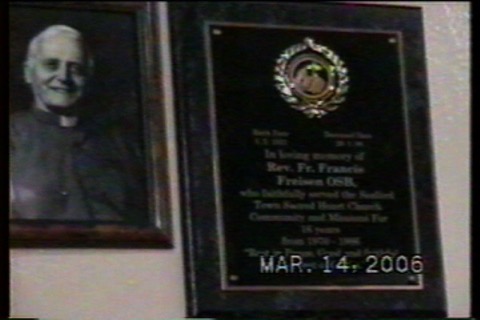
Plaque in memory of Father Francis Friesen. Photo: Ken Hayward
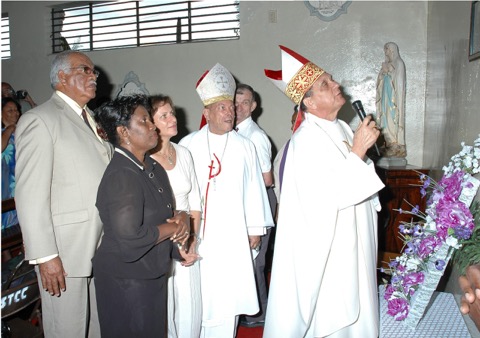
Roman Catholic Bishop Of Montego Bay, Charles Dufour, dedicates a plaque in memory of Dutch monk, Father Francis Friesen, on March 14, 2006, in Seaford Town, Westmoreland. Looking on (from left) are: Westmoreland Custos, Owen Sinclair; Elaine Shakes, manager, Seaford Town Vocational Training center manager; Maria Friedrich–Boerger, Counsellor and Deputy Head Of Mission at the Kingston Embassy of the Federal Republic Of Germany; and Roman Catholic Archbishop Emeritus of Kingston, the Most Rev. Edgerton Clarke. Photo: Byron Balfour
(Source: Byron Balfour Communications Inc., March 17, 2006)
TRIBUTE of Abbot John Pereira and the monks of Mount St Benedict
Abbot John Pereira and the monks of Mount St Benedict report the sad news of the passing away of Fr Francis Friesen in Berchmanianum, Holland on Sunday 29 January 2006. (Berchmanianum is a home for retired and infirmed priests and male religious) He had suffered a massive heart attack the night before. Fr Francis may best be remembered for his extraordinary grasp of Holy Scripture and his appreciation of the new wave of Biblical criticism which he imparted with great enthusiasm to many novices and seminarians in the aftermath of the second Vatican Council.
Born on 01 May 1921, he was looking forward to the celebration of his 85th birthday later this year. He professed his vows at Mount St Benedict on 05 October 1947 and was ordained to the Priesthood on 10 May 1950.
As a young priest he was sent to Louvain University in Belgium, where he studied the Biblical Languages from 1959 to 1961. Later Fr Francis received the Diploma in Bible Studies and Biblical Archaeology from the Dominican Bible Institute in Jerusalem. He then went to the Benedictine College in Rome, Sant’ Anselmo, where he continued his Biblical Studies and received the Doctorate in Theology (Exegesis).
At Mount St Benedict, his life was centred around the formation of the young monks and seminarians who were then under the charge of the Benedictines. He was Rector of Studies for the monastery and the seminary. He also did yeoman service in the building up of the Monastery Library and later the Seminary Library.
Fr Francis also did tremendous work in Jamaica. He taught Scripture at St Michael’s Seminary there and was also involved in parochial activity. He worked in the parish of Seaford Town for many years, and he is fondly remembered there up to this day. In 1978 he established a Vocational School as a Church-State Venture, the money coming from the Bishops of Germany. There was an arrangement between the Diocese and the Government. The Government paid the salaries of the Teachers and the Diocese provided the Land. The German Bishops sponsored the Buildings. The Jamaican Government regarded the infrastructure development (access roads, electricity, water pipes, etc.) as a model for the rest of Jamaica. The name of the School was Seaford Town Industrial Training Centre, but later the name was changed to St Boniface Vocational School, bringing out the Benedictine connection. The English Benedictine St Boniface, was the apostle of Germany.
A few years later another venture was launched, this time in the medical field. This was called Sacred Heart Clinic to care for a large section of the people in the interior of Western Jamaica. This was also on the property of the Church and built by the German Bishops. All this time, Fr Francis had hoped that this would be the beginning of a new Benedictine foundation outside Trinidad. A museum was also established between the Rectory and the Church, showing the background of the people in the mission. There was always a stream of visitors, local and foreign. It was also a welcome source of income for the mission.
In May 1986 Fr Francis got a breakdown and was hospitalized in Montego Bay. He got completely blind in two days time. He then resigned from the mission and Bishop Clarke gave him the last sacraments. Friends insisted that he should go to Holland for treatment, if he would survive. His niece came from Holland to fetch him and traveled with him to Holland where he was hospitalised in the Harbour Hospital in Rotterdam. He remained totally blind in one eye and partially in the other. He then found refuge in Berchmanianum on 01 September 1986.
One of his disappointments in life was the non-establishment of a Benedictine foundation from Trinidad in Jamaica. His hopes came to an end when the Benedictines chose to establish a monastic foundation in Guyana.
Although living away from the monastery of Mount St Benedict for several years (first in Jamaica and then in Holland), Fr Francis always considered himself one with the monks at Mount St Benedict. While in Jamaica he received several monks from Trinidad as co-workers in his mission there and as friends. In Berchmanianum, he continued his correspondence with the Abbey in Trinidad and would often receive monks from Trinidad on their trips to Europe. He kept up with all the happenings at the Abbey in Trinidad and was an avid reader of the Catholic News. He read up to his last days assisted by a device specially designed for the visually challenged.
His mind was sharp to the end and he had a great sense of humour. We will all miss his wonderful personality and ready wit. The Abbot and monks request the prayers of the faithful.
Abbot John Pereira, OSB Abbey of Our Lady of Exile, Mount St. Benedict, Tunapuna, Trinidad & Tobago
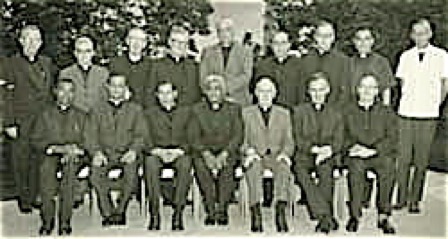
Episcopal Conference of 1967, taken in Montego Bay when Fr. Francis Friesen was one of the secretaries, serving especially the Dutch-speaking bishops who needed help with translation into English. From Mt. St. Benedict archives.



